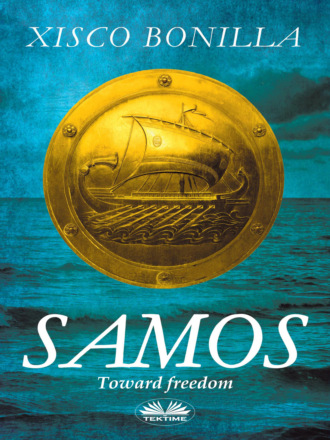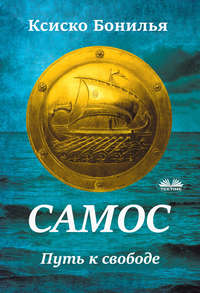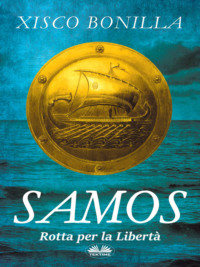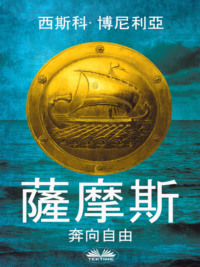
Полная версия
Samos
The small group, led by Zamar and escorted by four sailors, began to move forward through the city’s congested. The port had an intense smell, stalls with roasted sardines spread the characteristic and penetrating aroma of the food they cooked. The street stalls also sold beer, wine and a variety of highly seasoned foods that pervaded the senses of passers-by with strong aromas. The three children were starving, having only been fed water, flour and scraps that had been provided sporadically by some sailors for more than a week.
Zamar’s men led them along narrow, shady streets entering the crowded city. The port smells gave way to other strong aromas. The residents’ faeces ran down the edges of the narrow streets and insects wandered next to it freely. Some rodents also enjoyed the atmosphere and Almices recalled time spent with Telma back home. The journey through the city led them through different neighbourhoods. This was the children’s first experience of city life. With the exception of Almices, his sisters had never left the small village, a population of less than two hundred. Janira, despite being chained up, was wandering away from her constraints. With wide eyes, she watched many of the city’s strange characters. Almices was disappointed with what he saw as they entered the metropolis; it was more like a pigsty than a city, so different from the distant Greek acropolises he had visited with his father. Nerisa did not understand how so many people could live in so little space. As she missed her beach and her house, she instinctively grabbed her little sister's hand more forcefully.
It was a long walk through uneven and disorderly streets. They passed through the tanners district, which treated leather and created a nauseous and foul odour that filled the nostrils of all passers-by. They also passed through the basketeers' district, where they observed magnificent works of art made from palm and cane in doorways for the best bidder to take. In the weavers' district, the streets were covered with hundreds of fabrics and carpets covering the walls of the houses forming a multi-coloured mosaic that seemed to give way to another world. Nerisa admired the vivid colours of the fabrics that brought figures to life in multiple ways. They continued to walk until little by little the houses were more spaced out. They turned a corner and before the group, the hills that flirted with the city opened up over the walls.
The children's ankles were already bleeding when they passed beyond the walls. Zamar and his group took a narrow, poorly travelled path that disappeared climbing up behind a small hill. After reaching the summit, the children looked on the other side at their destination. At the foot of the hill, on its eastern slope, there was a small group of houses that surrounded a small square which occupied an important area of land.
Almices looked at the large wooden cages inside the stockade and realised that Zamar was taking them there. The path descended down a winding road until it reached the enclosure and continued next to the stockade built with irregular wooden planks, dry straw, and mud, forming a barrier slightly taller than an adult. He thought it would not be hard to jump. They continued to skirt the structure until a large door formed by two heavy panels of wood that was closed. Zamar drew his sword and energetically knocked on one of the doors with the its hilt. They waited a while, and the door began to open. A very small man, Nerisa's height, began to open the heavy door to allow the pirate's entourage to pass through. The dwarf recognized the captain and greeted him, they exchanged a few words and the little man gestured for them to follow him. The whole group advanced through the enclosure behind the captain. The children looked around with fear of the unknown reflected in their eyes.
Inside the enclosure was spacious, with a large path dotted on both sides by several adobe buildings. Many people worked on different tasks. It was as if it were a small town, a village growing in the shadow of a big city. In the centre of the square, standing out from rest, were the huge wooden structures that Almices saw from the top of the hill. The group continued to move forward until it passed them. The smell coming out of the cages was strong and sour. The children looked at the people locked in there. Dirty, poorly dressed or even naked. Their dull eyes looked at them as if they were ghosts. Men, women, and children divided into various compartments. Individuals who were afraid and others who inspired pity. All very different from each other. All of them slaves.
The dwarf advanced to a stone construction that stood at the bottom of the stockade. The group stopped next to the building. The little man spoke to Zamar in the strange language that Almices heard before and the two men walked until they vanished inside the house.
It had been a while since the captain entered what seemed to be the main building of the grounds. The sailors relaxed talking about their things and the three children, still in chains, spoke quietly among themselves about their impressions when the door of the house opened again, This time to give way to Zamar and a man in his fifties, with a greying beard, somewhat shorter than the pirate, and fatter. He must eat well. Both of them proceeded in silence to the children. The stranger stopped in front of the three siblings, looking at them with expert eyes, scrutinizing the possible defects of the merchandise, evaluating their commercial possibilities. He made them open their mouth, which Almices resisted until another blow on his ribs made him change his attitude. The examination barely lasted a moment. The man exchanged a few words with Zamar, and they both returned to the house.
The children now became more aware of their situation. Their price was being negotiated. It seemed that his fate was decided and that, despite his insistent pleas, the captain would sell them to that man. The three of them held hands as they exchanged glances.
The door opened again and Zamar came out smiling. He closed the door behind him and approached the group. The children thought for a moment that they had been wrong about him.
"Well, it seems that this is where we part ways.” He walked toward the children raising his arms unable to suppress a smile on his face. “You now have an owner.”
"What have you done to us?” Nerisa spoke bitterly, with an insecure voice. It was the confirmation of their worst fears.
"I've sold you to one of the best-known slave traders in Tyre and the truth is, at a very good price.” He touched his right hand to the bag that was hanging from his clothes. “It won't take long for you to get to know a new home. He has to earn back what he paid for you.”
"You're despicable," Almices spat.
"Don't believe it, like I said, I did a you favour rescuing you and preventing you from dying of thirst, even though I regret what happened to your sister. “I have asked him to try to sell you together," he lied. “Think of it as a transaction, I saved you and you have rewarded me for it; otherwise, it was a pleasure.”
The pirate said goodbye without waiting for an response and turned to his men, signalling for them to accompany him, and they left. The siblings were left behind, waiting for their uncertain future, guarded by two muscular men as towers that were about thirty.
After a while, the door of the building opened again, and the slaver approached the children.
"How old are you?" He addressed Almices in a rare Greek.
"Ten," said the boy sheepishly.
"And what can you do?" the slaver scrutinised the child.
"I am a fisherman, but we have done nothing to be here.” He was ignored.
"Do you just speak Greek?”
"I speak it and write it.”
"You write it? Wow, very interesting. And you?” He now addressed Nerisa and Janira.
“We help our mother at home, we speak Greek and write a little too.” Janira remained quiet.
"Very interesting," he repeated. “You won't spend much time here. Tomorrow is market day, so we will take a quick tour of the city and let the gods be virtuous and blessed.” "He said goodbye to them with an inexpressive gesture.
The two men who remained guarding the children took them to the cages on the square. When they arrived, one of them opened a door by moving a heavy metal bar. They were placed inside, and the door bolted. The cage was empty, as though reserved for them. The only thing inside was a small bowl of water. Janira ran as fast as the shackles would allow to the bowl and began drinking. Her brother and sister joined her. They quenched their thirst and sat in the shade of wooden planks that made up the cage roof. They huddled together, just like when they lost their sister. They looked hopeless and pitiful, like the others in the adjacent cages. There were no words, none of the slaves spoke, only absolute silence. Words were not going to restore their freedom.
The rest of the day was spent in complete silence. Janira looked through the bars at the huge dogs sleeping on the square. They were taking advantage of the shadows of the nearby buildings. Nerisa cried unconsolably thinking what would be of her sister if they were separated. Almices, for his part, did not stop thinking that this could be the last night he spent with her sisters, and regretted having failed them and not being able to help his parents.
It was late in the afternoon when a small group of men approached the cages followed by some of the dogs swatting flies with their tails. They stopped in front of the cage, inspecting its occupants. They spoke that same strange language that the children heard Zamar speak earlier. A strange language, Almices thought. It became more apparent to him that they were previewing the merchandise they would buy the next day. The young man then began to examine those men in turn. There were about eleven or twelve of them, all well-dressed. Their tunics represented their good social and economic standard. Almices imagined their professions: Merchants, princes, powerful people without a doubt. With their diverse expressions, some kind, others treacherous and mean, they studied them with curiosity. What had brought them there to buy slaves? He concluded that both his sisters' fate and his destiny were completely out of their hands.
How strange it was to watch the sunrise from inland. Almices and his sisters had always seen it rise from the sea. The three had an uncomfortable night, closing their eyes for brief periods only to open them again startled by the fear of losing each other. Nerisa had exchanged a few words with a Greek woman who was in the adjoining cage. She explained that they were on the estate of one of the largest slave traders in the region. She had ended up there because her father could not pay off his gambling debts and had given her away for a set time to pay the debt and for her freedom. That was more than a month ago. She also explained to them that once a week they loaded two slave-laden cars and took them to market in Tyre to sell them. Apparently, the supply of slaves at the farm was constant.
The sun was already completely visible when a dozen men approached the cages accompanied by two carts pulled by ox. That morning happened to be the morning market in the city. The children stood up, nervous. Two men approached them. They hugged each other tightly, scared. The men forced them to climb one of the carts. From its wooden sides emerged tall spikes pointing to the sky. Sewn together by other smaller pieces of wood, placed horizontally, they formed a dense net topped by another dense net of smaller pieces of wood, like a roof that made any escape impossible. At the rear, a sturdy door was bolted shut after all the occupants were on board. In a short time both carts were full. Almices counted twelve people in his cart and six in the other. The occupants of the other cart were more or less strong men, all with shackles on hands and feet and all connected by the same chain. They seemed like dangerous men, judging by the measures taken by their custodians, eight heavily armed men escorted that cart. But only two guardians guarded their cart, one sitting in front of the cage and the other on foot behind. Almices then stopped to observe his fellow travellers. His sisters stood beside him, with no space to sit. In front, along with the driver of the cart, five young women who were around twenty years old, with jet black hair, and oily skin, their traits seemed of distant lands. On the other hand, the woman who Nerisa spoke to during the night was pleasing with the custodians that it was a mistake, that she had to wait for her father. Next to her, a couple, and their son, about the age of Almices, were hugging.
They saw the slave master arrive in a lavish cart adorned with brightly coloured fabrics that bore four robust ebony-coloured porters. The trafficker had put on his best attire. He led the entourage. They crossed the square and went south, Almices was surprised to leave behind the path they took with Zamar the day before.
"Where are they taking us, Almices?”
"I suppose to sell us, Janira; but I don't know if in Tyre, we didn’t come this way yesterday.”
"I want to go with you.”
"Now, they will not separate us, we are siblings, you heard what Zamar said.”
"I'm not so sure," Nerisa interrupted.
"Why do you say this, Nerisa? It does not make sense for us to be separated.”
“Sense? Where is the sense in the, Almices? Think about what has happened to us so far, think about what they have done to that woman.” He glanced the woman who was still calling for the man who put her in the cart, insisting that it was a mistake. “I fear the worst, they will sell us separately, I am sure.” Nerisa's eyes reflected a bad omen.
“No, I don't think so.”
"Don't worry now, Janira," Almices stared at Nerisa. “We can do one thing to make sure.” The girls looked at him, waiting. “The truth is, we don't know when or whom they are going to sell us to. It is true that we do not know whether or not they will separate us; whatever happens to us or who buys us, the important thing is that we stay alive and vow not to rest until we meet again.” His sisters’ eyes welled up, about to cry.
"Let's swear it now.” Nerisa grabbed hold of her brother’s and her sister’s hands tightly.
"Yes, that's how we'll find each other.” The little one was now a little livelier.
"Let’s promise each other then.” Almices also took Janira's hand, forming a small circle between the three of them. “Repeat after me: I swear that wherever I am, I will look for my siblings until I find them and regain my freedom. I swear on my parents.” The girls repeated the oath while the other occupants of the cart, except the woman, who had already given up, looked at them not understanding what they were saying. Their language was foreign in these lands. The three children embraced each other affectionately, just as they had done on countless occasions since Almices turned ten. The tears now descended freely down his cheeks.
The entourage continued to move south to border one of the hills and then turned west toward the sea. Soon the city was in sight. Tyre was a city that after its reconstruction had grown along the coast taking advantage of the possibilities of maritime communication provided by its coveted geographical situation. As they approached the southern part of the city, more people were coming and going from their daily chores. They reached the foot of the small wall. Almices was surprised that such a large city had such a low wall. He would later learn that the residents no longer valued the walls. The city, which had long been the safest and most impregnable city in the world, had in fact remained undefeated until one hundred years before when the great Alexander besieged her with his Macedonian hosts and took her, exceeding all expectations. Below the walls, a flurry of people kept coming and going from one side to the other. The convoy arrived there and stopped in front of a very busy wooden raised decking.
The carts stopped next to some shops and the dealer entered one of them. The guards opened the cart gate where the children were and sent them inside one of the shops. It was built with long, dark wooden poles fastened together with strong hemp rope and had thick multi-coloured fabrics as walls. The captives crossed the shop and went out through a rear. There, a series of thick stakes driven into the ground were used for the guards to chain them to. It was a small square hidden from the outside where the carts had been left, away from prying eyes. From there the children could see the deck from behind. A simple staircase connected the ground to the decking. The guards brought the salves from the other cart next to the stakes. As always, they remained heavily guarded.
After a while, the slave master appeared. He was chatting with another elegantly dressed man in a rich, colourful tunic and braided sandals on his feet. They looked closely at the enslaved and continued their conversation. The murmur of people outside was increasing as the sun was climbing in the sky. At mid-morning, the slave owner's companion climbed the stairs to the platform and began to initiate appeals to the people accumulating outside. The guards roughly took the men from the other cart up to the platform. The man in the multi-coloured tunic was offering these men, who remained heavily guarded, flaunting the powerful musculature of one of them or the stature of another.
"They're selling them. They are selling them together.” Nerisa seemed hopeful.
"It's true," Janira said. “They will sell us together.”
The barter continued between the man on the stage and the roaring audience. The children did not understand what they said, but it seemed clear they were haggling. It carried on for quite some time, until at last three of them were brought down by some of the guards, walked past them prodded by the spears of their custodians, and were brought back into the shop.
"They have sold them separately," the boy's words reflected overwhelming gravity and pessimism. His sisters were silent. They hugged again, as if that were the last time.
The sale continued for much of the morning, until it was the children’s turn. The guards brought them up along with the Greek woman and the couple with the child. Everyone remained quiet, fearful of what might happen, with shackles on their feet. Their guards did not seem concerned that they might escape.
From the platform you could see the whole atmosphere of the square. There were many platforms, placed in a semicircle occupying a large space, numerous people wandering among them listening to the traders and looking at the human merchandise on sale. The man in the polychrome tunic began promoting his products to try and get the best sale. The public crowded round, to enjoy the show. Soon the bids began. When the sale was closed, a woman wearing beads released a victory cry, the guards grabbed Janira and took her down. Almices and Nerisa tried to keep her screaming and fighting, several blows to their backs deterred them.
The bidding resumed while the siblings watched helplessly with tears in their eyes as Janira disappeared in the crowd, not even giving them time to say goodbye to their little sister. The trader was increasingly raising his voice to attract the attention of potential buyers, pointing now to one, then to another. Another deal was closed, and the guards took the man while his wife and son cried. There was an uproar among the people. It was as if the public enjoyed watching the slaves suffer.
The seller continued to offer them to passers-by. The auction began again, without the children understanding what was said. This time it was tougher, however the guards finally took Nerisa and the woman she had talked to during the night. Nerisa, unable to articulate words, threw a deep and sad look at her brother, thinking that would be the last time she saw him. She walked down the steps as best she could, her legs barely holding her up, her eyes again filled with tears. Her heart was broken.
Almices felt sunken, he had just lost all his family. He lost all sense of time and before he knew it one of the guards pushed him down the stairs. The young man snapped back to reality and realized that he already had an owner. The guard took both he and the other boy back inside the shop. They both looked frightened, their fate unknown. Apparently, they had been sold to the same owner. A man, whom Almices had not noticed before, stood up to greet four others who entered the shop. He spoke for a moment and one of them approached the boys examining them carefully. Almices recognized him from the previous day, he had a dark complexion, a hooked nose and black hair, about twenty-five years old and a friendly looking. They spoke again and the man took a leather bag out of his robe and paid the other a handful of coins.
With a reassuring smile he turned to the boys, speaking to them in that unknown language. Then, a few lashes on the boy’s backs indicated that the hour of the pleasantries had passed and that it was time to get started. Almices was getting tired of friendly smiles and being hit.
The man marched into the centre of the city, entering through the south gate of the small wall. The other three followed him, pushing, and mocking Almices and the other boy. The city constituted a complicated and chaotic network of streets that twisted and turned without any order. They passed through densely populated neighbourhoods, their inhabitants barely paid attention to the small group. The boys were still walking with shackles on their ankles, which made the march slow. The wounds on Almices' ankles started to bleed again. They passed through stinking streets, some sections flooded with faeces and urine, giving off a strong smell that the boy already considered normal for a big city. Both boys were disoriented, the zigzagging streets had made them lose their sense of direction. They turned one corner and were surprised to see the sea. The alley ended by a narrow opening of the wall, which led to a long avenue bordering the coast. From there they continued northward. In the distance that what was once the original city of Tyre was perfectly visible. Thanks to Alexander the great, it was forever connected to the continent.
The long street, actually a narrow strip of land between the ocean and the wall, was full of people fishing. Almices recognized the tackle that his father and the other men in the village used. The tanned fishermen repaired the nets or prepared the fish in salt to take inland. Some women and children helped with the work. The fishing boats were somewhat different, they had more elongated shapes and most did not have portholes nor were the bows extravagantly decorated, although some of the sterns featured a carved equine figure. The small constructions built between the street and the wall were very fragile and small in sight. Almices thought many of them would house whole families like his. He remembered his mother preparing food next to the window of his house.
The road continued north. As they approached the peninsula that was once the great and impregnable Tyre, small houses gave way to increasingly large warehouses. The fleet of ships docked at the bottom was no longer formed by fishing boats; most of them were cargo vessels, or warships, probably from the same city.
The man turned again toward the wall, in that place slightly further from the coast, and entered through another small door, zigzagging through a few streets to end up in a square full of merchants who exhibited their items on the ground in view of potential buyers. Weavers, cattle ranchers, horticulturists, scribes, fortune tellers, healers, charm sellers; everything one might need could be found in that square. They crossed it through the centre and entered cul-de-sac, which ended up in a small courtyard preceded by a large arch. They headed to a door on the right. A servant greeted the man and opened the door. They entered another inner courtyard, which looked more like an orchard than the inside of a house. Tall palm trees stretched up to the sky and rounded orange trees scattered the courtyard, surrounded by thick, low hedges forming a geometric structure around the trees. The small group stopped under the shade of the palm trees.





